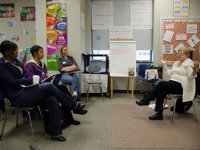How Teachers Can Share Their Own Learning
Your content has been saved!
Go to My Saved Content.How about that post professional development evaluation survey? We've all done them; but what have they done for us? Professional development (PD), when well done, can make a huge difference in teachers' knowledge and skills. But it can be challenging to evaluate how PD transfers to actual classroom practice.
Traditional approaches to professional development evaluation focus on participation, satisfaction, and learning related to activities. Typically, this information is collected through paper or online surveys completed at the end of sessions, in which teachers rate their learning experiences, provide feedback on activities, and make recommendations for future sessions. While these types of data are necessary, they do not show evidence of what teachers learned -- or how their practices may have changed and improved.
A New Approach
In the same way that we need multiple measures to assess student learning in classrooms, we need to broaden the assessments used to evaluate what teachers learn through professional development. We need to move beyond program evaluation to assessment of teacher learning.
We have discovered one effective way to do this in the Bay Area Performance Assessment Network (BAPAN) in Northern California. BAPAN is a professional development initiative focused on arts-integrated performance assessment. Funded by the William & Flora Hewlett Foundation, BAPAN offers professional development to teachers and leaders in schools and districts in the Bay Area. BAPAN is a collaboration between Envision Learning Partners (ELP), a consulting subdivision of Envision Education, and the Alameda County Office of Education (ACOE).
Since 2011, ELP has provided professional development to over 50 BAPAN teachers and school leaders in 11 schools. Participants in BAPAN participate in a year-long series of professional development and coaching sessions focused on designing and implementing a performance assessment system aligned to a graduate profile, which defines what students should ultimately know and be able to do to be college and career ready.
In spring 2013, ELP Professional Development Director Symon Hayes created a teacher performance assessment that mirrors Envision School's College Success Portfolio Defense. Teachers, like Envision students, collected evidence of their learning and defended their work in a culminating exhibition in front of peers and educators.
To graduate from Envision Schools, seniors have to defend a portfolio of college-ready work aligned to rubrics that measure the Deeper Learning Outcomes:
- Master core academic content
- Think critically and solve complex problems
- Work collaboratively
- Communicate effectively
- Learn how to learn
- Develop academic mindsets
Students defend work to a panel of peers, educators, and mentors. This much-anticipated event is the culminating performance assessment that launches students to college and career.
Time for Teachers to Shine
Similarly, BAPAN teachers now show what they know and are able to do in a final exhibition of learning. In the first-ever BAPAN Teacher Defense, teachers shared their learning journey from the year, as well as examples of student work that demonstrated this learning. Areas of focus included: effective collaboration techniques, using studio habits of mind (SHOM), the crafting and use of learning targets in daily instruction, integrating research methods as higher order thinking, the critique and revision process, and the creation of interdisciplinary multi-grade performance assessment.
What teachers presented aligned with BAPAN's essential questions and learning targets. Each team, however, designed their exhibition based on what sparked their creativity and best demonstrated their individual learning. As a result, the modes of presentation varied from verbal presentations to video documentation and student interviews. BAPAN teachers and Envision staff proved to be an authentic audience, asking probing questions of the presenters to better understand the learning process and uncover potential opportunities for applying this learning in their own context. The level of learning, the quality of presentations, and the thoughtful questions and responses were an encouraging sign and proved to be the catalyst needed to revise this process to develop the 2014 BAPAN defense.
In spring 2014, BAPAN teachers will show what they know and are able to do in a revised version of ELP's Teacher Exhibition. Based on what we learned in the first exhibition, we plan to develop a teacher defense rubric that will be used to assess teachers' exhibition of learning. Similar to the defense rubric used for student defenses in Envision Schools, we will collaboratively design criteria to describes what success looks like. By sharing this with BAPAN teachers early in the learning process, they will have a clear understanding of expected outcomes not only of the defense, but also for the year of working together, and ample time to collect evidence of their learning.
Teacher exhibitions are a great way to capture learning that happens as a result of professional development. As a culminating event, they are a fun and engaging way to affirm what teachers can do and build a strengths-based professional learning community.
How do you evaluate professional learning? How might you include performance assessments (or exhibitions) as part of your professional development?
Bob Lenz would like to acknowledge two of his colleagues who collaborated with him on this post, Symon Hayes and Sally Kingston.
